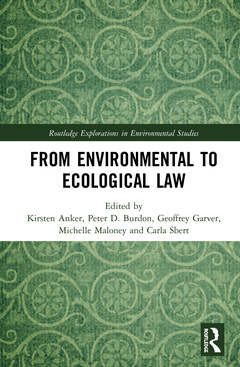From Environmental to Ecological Law Routledge Explorations in Environmental Studies Series
Coordonnateurs : Anker Kirsten, Burdon Peter D., Garver Geoffrey, Maloney Michelle, Sbert Carla

This book increases the visibility, clarity and understanding of ecological law. Ecological law is emerging as a field of law founded on systems thinking and the need to integrate ecological limits, such as planetary boundaries, into law.
Presenting new thinking in the field, this book focuses on problem areas of contemporary law including environmental law, property law, trusts, legal theory and First Nations law and explains how ecological law provides solutions. Written by ecological law experts, it does this by 1) providing an overview of shortcomings of environmental law and other areas of contemporary law, 2) presenting specific examples of these shortcomings, 3) explaining what ecological law is and how it provides solutions to the shortcomings of contemporary law, and 4) showing how society can overcome some key challenges in the transition to ecological law.
Drawing on a diverse range of case study examples including Indigenous law, ecological restoration and mining, this volume will be of great interest to students, scholars and policymakers of environmental and ecological law and governance, political science, environmental ethics and ecological and degrowth economics.
Introduction PART 1: Overview: from environmental to ecological law 1. The transformation of environmental law into ecological law PART 2: Problems with contemporary law: two illustrative examples 2. The targeting of environmentalists with state-corporate intelligence networks 3. Ecological jurisprudence beyond Earth: toward an outer space ethic PART 3: Solutions in ecological law 4. Ecological law in the Anthropocene 5. Restoring land, restoring law: theorizing ecological law with ecological restoration 6. Are rights of nature radical enough for ecological law? 7. Ecological jurisprudence and Indigenous relational ontologies: beyond the “ecological Indian”? 8. Conjuring sentient beings and relations in the law: rights of nature and a comparative praxis of legal cosmologies in Latin America 9. Needs-based constraints in an ecological law transition 10. The potential of the trusteeship theory for Canadian public law and environmental governance 11. African eco-philosophy on forests: a path worth exploring for the implementation of Earth jurisprudence PART 4: Challenges in the transition to ecological law 12. Green(ing) legal theory: social logics and their re-formation 13. Lawyers and ecological law 14. Learning sacrifice: legal education in the Anthropocene 15. Tribal ecological knowledge and the transition to ecological law 16. Practical pathways to ecological law: Greenprints and a bioregional, regenerative governance approach for Australia
Kirsten Anker is Associate Professor at McGill University Faculty of Law. She is a member of McGill’s Economics for the Anthropocene (E4A) project, and Centre for Indigenous Conservation and Development Alternatives (CICADA).
Peter D. Burdon is Associate Professor and Associate Dean (Learning and Teaching) at the Adelaide Law School.
Geoffrey Garver teaches environmental courses at McGill University and Concordia University and coordinates law and governance research for the Leadership for the Ecozoic program (www.l4ecozoic.org), formerly the Economics for the Anthropocene Partnership (e4a-net.org). He has a PhD in geography and an LLM from McGill University and a JD from the University of Michigan Law School.
Michelle Maloney (BA/LLB(Hons) Australian National University, and PhD Griffith University) is Co-Founder and National Convenor of the Australian Earth Laws Alliance (AELA), Adjunct Senior Fellow, Law Futures Centre, Griffith University; and Co-Founder and Director of the New Economy Network Australia (NENA). She advocates for systems change to move industrialized societies from a human-centered to an Earth-centered governance system.
Carla Sbert is an independent researcher in Quebec, Canada. Born in Mexico, where she studied law at ITAM, she also holds an LLM from Harvard Law School and a PhD in law from the University of Ottawa.
Date de parution : 08-2022
15.6x23.4 cm
Date de parution : 12-2020
15.6x23.4 cm
Thèmes de From Environmental to Ecological Law :
Mots-clés :
Environmental ethics; Legal theory; Ecological jurisprudence; EU ETS; NSW Police; Chapin III; Young Men; Socioeconomic Development; Recreational Vehicle; Marine Genetic Resources; Socio-economic Development; EU Emission Trading Scheme; Ecological Law; Lummi Nation; Public Trust Doctrine; Aba Model Rule; Aba Standard; Treaty Rights; Cosmological Proposition; Ecological Restoration; Australian National University; Bears Ears; Indigenous Legal Traditions; Navajo Nation; Earth System Change; Ecological Primacy; Ecosystem Relationship



